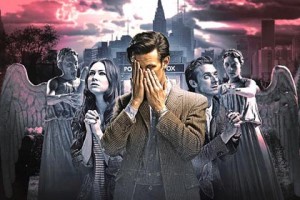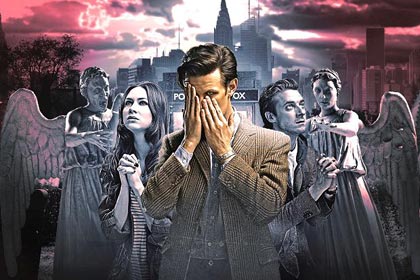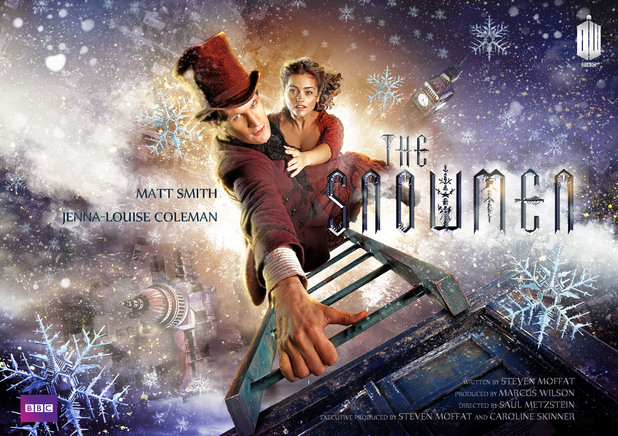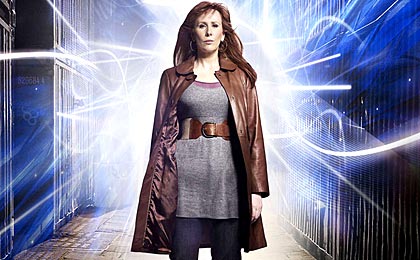 I knew there was some trouble brewing when I saw the reactions on Twitter to Angels Take Manhattan, the mid-season finale to Doctor Who and the final episode featuring the Ponds as companions. Fortunately, no one I follow spoils anything, but when one tweeter asked if we had to worry about the 50th anniversary episode after see this, it raised a red flag. After watching the episode for myself, I have to wonder the same thing.
I knew there was some trouble brewing when I saw the reactions on Twitter to Angels Take Manhattan, the mid-season finale to Doctor Who and the final episode featuring the Ponds as companions. Fortunately, no one I follow spoils anything, but when one tweeter asked if we had to worry about the 50th anniversary episode after see this, it raised a red flag. After watching the episode for myself, I have to wonder the same thing.
Let’s get the things I did like about the episode out-of-the-way, because they will be short. Finally, the Angels are used as they were originally written. Stealing people and sending them back in time to feed off the temporal energy. This was one of the cool things about the angels, and what really made them a menace. They didn’t kill you, but sent you back in time far enough that you wouldn’t meet yourself. Their major creep factor was that they could be anywhere. Any statue could be a weeping angel in disguise.
While these elements were back, they really weren’t used effectively. They were either used too much, IE, EVERY statue in New York had an angel, including the Statue of Liberty. It might sound cool at first, but was really was far too implausible. And what is up with the Angels sending people back, but not far enough to keep them from meeting themselves and causing the one thing that can stop them? I hate when the villains have to be made stupid and not follow their own rules in order to make the plot work. Moffat had to do this twice. I’ll talk about the second time a little further down.
What really made this episode a big disappointment to me was the whole “if you read it out loud, it becomes fixed in time.” Really? Just reading or saying something makes it unavoidable? If you make that canon, you have invalidated most of the entire series. Fixed points in time are meant to be crucial moments that have to happen no matter what. They are sign posts and should be rare. Time is meant to be fluid with the fixed points being pit stops. Every single moment in a person’s life DOES NOT become a fixed point just because they think or say something. Saying “I think I’ll have eggs for breakfast tomorrow,” doesn’t make it inevitable that you will have eggs in the morning. Yet, this whole episode depends on this. And it is absolutely ludicrous. Either it’s a fixed point because it’s important enough that it can’t be changed, or it’s not. But the Doctor is supposed to have such an extensive knowledge of the time vortex, that he knows where the fixed points are. And while he can’t change the major events, he can affect smaller ones with the whole. Maybe you can argue that because this is part of the Doctor’s own timeline, he couldn’t see it, but then whether or not Amy read it wouldn’t make a difference. It’s going to happen, only the details can be changed. But I really don’t see Amy and Rory’s lives as being so important to the universe that their fates become fixed points in time.
The big problem I have with this being a fixed point though is that it is lazy writing. Moffat wrote the Doctor to become dependent on Amy and Rory, almost like he imprinted on Amy as the first person he met after regenerating, and the only way to break him away was to come up with this overly complicated plot to keep the Doctor from trying to save them. This brings me to the second time Moffat ignores the Angels own rules, that he set up, to get his big, traumatic ending for the Ponds. The Weeping Angel should not have been able to take Amy, even if she blinked, because the Doctor and River were looking at it as well. Though by the rules of the paradox, no Angel should have still been in New York to begin with, this surviving Angel should not have been able to take Amy. It should still have been quantum locked with the Doctor and River still looking at it. Yes, it was very emotional and heartbreaking, and very in character that Amy would want to follow Rory back, but it shouldn’t have been able to happen.
While all of these things are annoying, and kill the emotional drama Moffat was going for, there was one scene that not only got to me, but actually pissed me off. After the Doctor discovers River broke her own wrist to escape the cuffs (what, the Doctor doesn’t know how to pick locks? Hasn’t he met Harry Houdini?), she says to him, “When one’s in love with an ageless god, who insists on the face of a 12-year-old…” Ageless god? WTH?!?! The Doctor is not, has never claimed to be, and should never be called a god. Not by River, not by anyone! The whole series, old and new, has been based on the fact that the Doctor may be old, and an alien, but he is just as fallible as his human companions. He hasn’t even hit 1000 yet. That hardly makes him ageless, and he is anything but a god. Sure he can do some amazing things, but nothing he does is god-like, and she should know that better than anyone else. The other part of that scene that sent me off was his using his regenerative powers to heal her. That is not something he can do. It’s the whole reason that he can’t choose what his next regeneration will look like and is always so random. He can’t control his regenerative powers, but now, all of a sudden, he can call it up like a cleric and heal River’s wrist? NOT A GOD.
Even though I didn’t have high hopes for this episode, I thought the problems with it would just be emotional. I don’t condone killing most any companion (exceptions being Adric and Astrid), but the problems with this episode go so much deeper, and have serious repercussions for the whole Doctor Who universe. I am saddened that Moffat not only continued in RTD’s mistaken footsteps of making the Doctor into a beast that can only be tamed by a human companion, but that he continues to pile on the mistakes, and threatens to change the series I have loved for so long into something I no longer recognize. I don’t have any more trust in Moffat, and can only hope he doesn’t do any more damage.




Exactly. Where I had great hopes for Moffat based on ideas like the Library and the Weeping Angels, he’s shown that he just doesn’t have what it takes to run the entire show and keep it on an even keel. I thought they had someone on staff that knows the series and can catch massive continuity errors like this episode became, but instead, it was a mindless episodic romp and Dr. Who, like it or not, is not an episodic show. What the Doctor does has consequences up and down the line. It might ostensibly be a kids show, but I’ve even seen kids posting about how dumb they thought it was.
Very bad showing, Moffat. Very bad.